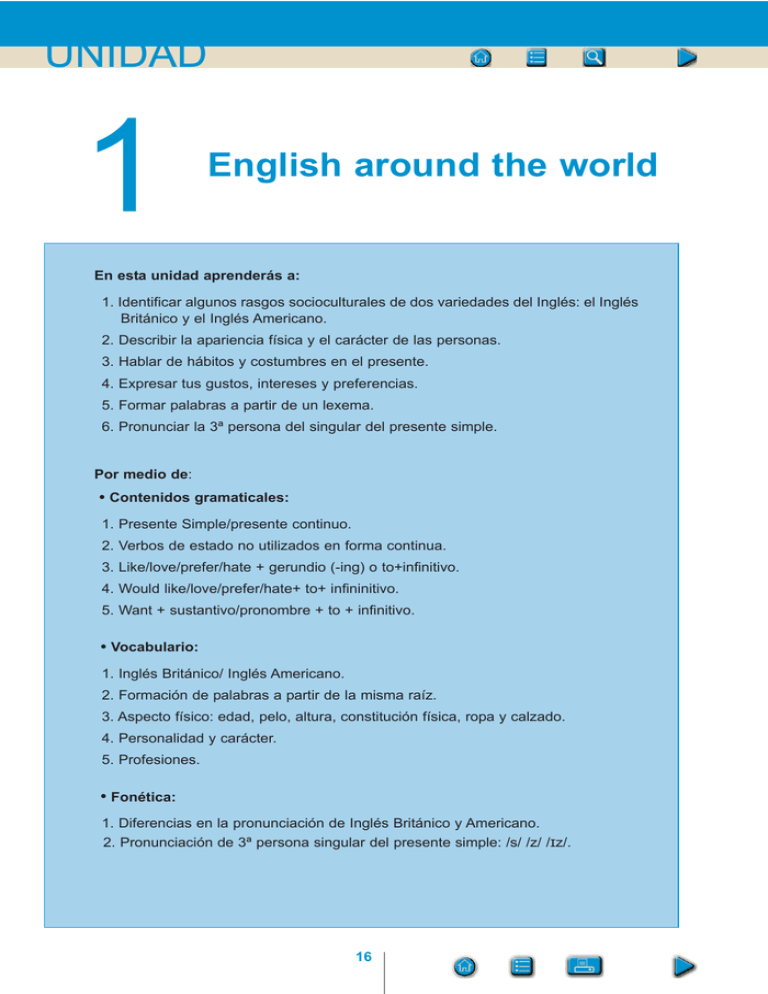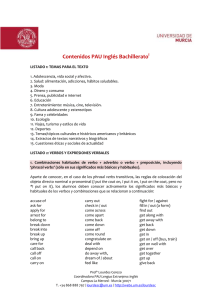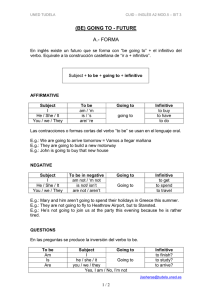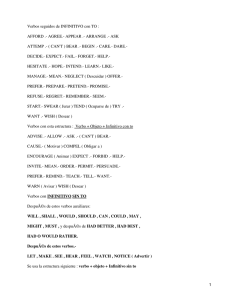- IES Reino Aftasí
Anuncio

UNIDAD 1 English around the world En esta unidad aprenderás a: 1. Identificar algunos rasgos socioculturales de dos variedades del Inglés: el Inglés Británico y el Inglés Americano. 2. Describir la apariencia física y el carácter de las personas. 3. Hablar de hábitos y costumbres en el presente. 4. Expresar tus gustos, intereses y preferencias. 5. Formar palabras a partir de un lexema. 6. Pronunciar la 3ª persona del singular del presente simple. Por medio de: Contenidos gramaticales: 1. Presente Simple/presente continuo. 2. Verbos de estado no utilizados en forma continua. 3. Like/love/prefer/hate + gerundio (-ing) o to+infinitivo. 4. Would like/love/prefer/hate+ to+ infininitivo. 5. Want + sustantivo/pronombre + to + infinitivo. Vocabulario: 1. Inglés Británico/ Inglés Americano. 2. Formación de palabras a partir de la misma raíz. 3. Aspecto físico: edad, pelo, altura, constitución física, ropa y calzado. 4. Personalidad y carácter. 5. Profesiones. Fonética: 1. Diferencias en la pronunciación de Inglés Británico y Americano. 2. Pronunciación de 3ª persona singular del presente simple: /s/ /z/ /wz/. 16 CONTENIDO Unit 1. English around the world GRAMMAR READING Varieties of English Presente Simple/Presente Continuo. Verbos de estado. Like/love/prefer/hate+ gerundio/ to + infinit. Want+ objeto+ to infinitivo. WRITING PRONUNCIATION Texto descriptivo Pronunciación del morfema de tercera persona de singular /s/ /z/ /wz/. VOCABULARY Inglés Británico/Americano. Formación de palabras. Aspecto físico/personalidad. Profesiones. LISTENING & SPEAKING Relacionar fotografías con descripciones físicas. FUNCTIONS Identificar rasgos socioculturales del inglés británico y americano. Hablar de hábitos en el presente. Describir apariencia física y carácter. Expresar gustos, intereses, preferencias Elaborar texto descriptivo. Unit 2. Sharing your experiences GRAMMAR READING The worst day in my life! WRITING Texto narrativo Pasado Simple/Pasado Continuo. Usos de Used to/ to be used to. (pág. 30) VOCABULARY Adjetivos + preposición. Prefijación I (Pref. Negativos) Cuentos y fábulas. PRONUNCIATION LISTENING & SPEAKING Pronunciación del morfema de pasado ‘ed’ /t/, /d/, /wd/. Relacionar textos con títulos Identificación de palabras. FUNCTIONS Hablar de experiencias en el pasado. Uso adjetivos con régimen preposicional Formar antónimos con prefijos. Elaborar texto narrativo. 6 Reading 1. Before you read the text take this quiz and find out what you know about the different varieties of English spoken in the world (1 ) a) In Great Britain English is spoken in: Big cities. England, Wales, Scotland, and Northern Ireland. Just England. b) English is also spoken as an official language in: Canada. Thailand. Are the following statements true or false? c) Grammatical differences between British and American English are few, however lexical and spelling differences are far more numerous. True False d) "Anglicisms" are words invented by people who are learning English. True False e) English is becoming a world language because about 1,000 million people speak English all over the world. True False f) People who speak "British English" and "American English" cannot understand each other. True False g) "RP" or "Received pronunciation" refers to the British standard accent used in dictionaries and textbooks intended for teaching English as a foreign language. True False 17 UNIDAD 1 ENGLISH AROUND DE WORLD 2. Read and listen to this text about British and American English (2 )( ) Varieties of English According to conservative estimates about 1,000 million people speak English all over the world. Mother-tongue speakers have now reached around 350 million; a further 350 million use English as a second language, i.e. to communicate with other speakers of the same country where different native languages are spoken; and the rest use it as a foreign language for international communication. Over the centuries, other languages such as Greek, Latin, or Spanish have been used as international instruments for trade, diplomacy or religion, but nowadays the rise of English to the position of 'lingua franca' is a fact. Its influence over other languages is so great that a lot of them include several English words in their everyday conversations. These borrowings are called anglicisms. Spanish for instance, has fully admitted words like “fúbol', 'yate' or the more up-to-date 'software', together with expressions such as 'comida light' or 'ser una fashion victim'. English is used as an official or semi-official language in over 60 countries, and has a prominent place in a further 20 in all five continents. Great Britain, USA, Australia, Canada, South Africa and India as well as the Caribbean are some of these countries. That's why there are so many varieties of English; nevertheless, there are two national standards that are overwhelmingly predominant: British English and American English. The English language was brought to America by colonists from England who settled along the Atlantic seaboard in the seventeenth century. There are differences between the English spoken in the United Kingdom, i.e. England, Wales, Scotland, and Northern Ireland; and the English spoken in the United States of America. The differences are mainly in grammar (eg: got / gotten), spelling (eg: centre / center), vocabulary (eg: autumn/fall) and accent. Nevertheless these differences are not so great as to stop people who speak "British English" or "American English" understanding each other. Grammar differences are the tiniest part of British-American variation. Spelling differences are more noticeable and many of them date back to the early nineteenth century when the dictionary-maker Noah Webster determined not to follow British standards in spelling, which he regarded as needlessly complex, and proposed the spelling system which is still in use in USA. Differences in vocabulary are in part due to America's rich immigrant stream that brought a host of words into the American language unknown for 'Britishers'. With regard to pronunciation, the English spoken in America shows a higher degree of uniformity. British English, however, has more dialectal differences. There is a lower-class London pronunciation variant known as Cockney; and 'RP' or 'Received Pronunciation' is the type of pronunciation which enjoys the status of 'standard' because it is the accent associated with the older schools and universities of England and has traditionally been the variety used when teaching English as a foreign language. 18 Comprehension 3. Answer the following questions about the text above (3 )( ) a) How many people speak English in the world? b) What is the difference between English spoken as a second language and English spoken as a foreign language? c) Try to explain the concept of 'lingua franca'. d) What is an anglicism? Find examples different from the ones given in the text. e) How many countries have English as an official language? f) Who brought English language to USA? g) What are the main differences between the two national standards discussed in the text? h) Why is Noah Webster mentioned in the text? i) What is Cockney? Where is it spoken? j) What does 'RP' stand for? BRITISH AND AMERICAN ENGLISH Ha quedado claro que además de pequeñas diferencias gramaticales como el uso del participio 'gotten' en inglés americano en vez de 'got' que es el utilizado por los británicos, existen diferencias en la escritura (spelling), en la pronunciación, y en el vocabulario. Vamos a revisar algunas de estas particularidades. 1. Escritura Las palabras que terminan en -our en BrEng. terminan en -or en AmEng. Colour (BrEng.) / color (AmEng.) Favour (BrEng.) / favor (AmEng.) Las palabras que terminan en -re en BrEng. terminan en -er en AmEng. Centre (BrEng.) / center (AmEng.) Theatre (BrEng.) / theater (AmEng.) Los verbos que terminan en -ize en AmEng. se pueden escribir -ise o -ize en BrEng. aunque la primera forma es la más frequente. Realise-realize (BrEng.) / realize (AmEng.) Recognise-recognize (BrEng.) / recognize (AmEng.) 2. Pronunciación En BrEng. la consonante 'r' sólo se pronuncia delante de sonido vocálico y normalmente no se pronuncia a final de palabra. En AmEng. sin embargo, la 'r' se pronuncia en todas las posiciones en las que se halla escrita Beer /bwc/ (BrEng.) / beer /bwcr/ (AmEng.) En AmEng. las consonantes 't' y 'd' se pronuncian como una 'd' suave entre vocales Saturday /t/ (BrEng.)/ Saturday /d/ (AmEng.) Algunas palabras que en BrEng. tienen el sonido /ju:/ se pronuncian /u:/ en AmEng. New /nju:/ (BrEng.) / new nu:/ (AmEng.) 19 1 UNIDAD ENGLISH AROUND DE WORLD Practice 4.Write the American English equivalent to the following words (4 apologise Behaviour A NA LYS E METRE L i t r e F l a v o u r ) Marbour honour Localise O R G A N I S E Learning Vocabulary 5. Here are a few of the more common words which are different in British and American English. This is only meant to highlight some of the variety which exists within English. It is not a complete list by any means. (5 ) Meaning Autumn Fall Otoño Lift Elevator Ascensor Flat Sweet Apartment Candy Piso Dulce, caramelo Pram Baby carriage Cochecito de bebé Film Movie Película Biscuit Cookie Galleta Single ticket One-way ticket Billete sencillo Chips Petrol Fries Gas(oline) Patatas fritas Gasolina Motorway Highway Autopista Queue Line Cola Post Mail Correo Ground floor First floor Planta baja Rubbish Windscreen Garbage Windshield Basura Parabrisas Holiday Vacation Vacaciones Car park Parking lot Aparcamiento 20 Working with words 6. Complete the following gaps with some of the words you have just learnt. Use the two equivalents in British and American English (6 ) a) This summer has been very hot but next…………….………… will get colder. b) We run out of………………………………...……….……. and our car stopped. c) We do not have to work because we are on…………...………….................... d) I've got to send this parcel by………………………..……………………………. e) We were very tired that's why we used the…….…….........rather than going up the stairs 7. Look up in a dictionary the British equivalent to these American words (7 ) Cab,vest, sidewalk, subway, faucet, truck, pants, 8. Complete the following chart that contains words from the text 'Varieties of English'. Knowing the different parts of speech can help you with reading and writing. Use a dictionary to help you to understand the words you do not know (8 )( ) Noun Verb Adjective Adverb Conservative Communicate Variety Overwhelmingly Noticeable Propose Prominent Include Different 21 1 UNIDAD ENGLISH AROUND DE WORLD Grammar PRESENTE SIMPLE (PRESENT SIMPLE) Afirmativa Sujeto + Infinitivo sin to Sujeto + Infinitivo sin to + s (3ª persona singular) I eat He eats Negativa Suj. + DO NOT+ Infinitivo sin to Suj. + DOES NOT + Infinitivo sin to (3ª sing.) I do not eat He does not eat Interrogativa DO + Sujeto + Infinitivo sin to? DOES + Sujeto + Infinitivo sin to (3ª pers. sing.)? Do you eat? Does he eat? Este tiempo verbal se emplea: a) Para expresar verdades generales o hechos que siempre se cumplen. Water boils at 100 degrees El agua hierve a 100 grados b) Para expresar hábitos o costumbres. He has lunch in this restaurant every day El come en este restaurante cada día c) Para indicar planes futuros. Suele referirse a horarios o programas. Our plane leaves in an hour Nuestro avión sale en una hora d) Para contar acontecimientos deportivos, historias, chistes, etc. Maradonna kicks the ball, and it's a goal! Maradona golpea el balón, ¡y gol! Reglas ortográficas En la tercera persona del singular se añade una s al infinitivo sin to excepto en los siguientes casos: a) Los verbos que acaban en s, ss, sh, ch, x, y o añaden es Pass passes Watch Wash washes Mix watches mixes Go Kiss goes kisses b) Los verbos que acaban en y precedida de consonante cambian la y por i y después añaden es Cry cries Fly flies c) Los verbos que acaban en y precedida de vocal, no experimentan ningún cambio y siguen la regla general de añadir s Play plays Say 22 says PRESENTE CONTINUO (PRESENT CONTINUOUS) Afirmativa Sujeto + BE + verbo-ing Negativa Sujeto + BE NOT+ verbo-ing Interrogativa BE + Sujeto + verbo-ing? I am eating She is eating I am not eating She is not eating Are you eating? Is he eating? Este tiempo verbal se emplea: a) Para acciones que están ocurriendo en el momento de hablar Mum is cooking now Mamá está cocinando ahora b) Para acciones incompletas que están ocurriendo, aunque no necesariamente en el momento de hablar We are building a new garage Estamos construyendo un nuevo garaje c) Para indicar planes o preparativos en un futuro próximo We're having dinner together tonight Vamos al cenar juntos esta noche d) Para acciones que se repiten de forma regular y que suelen llevar implícito un sentido de queja They are always complaining Siempre se están quejando Reglas ortográficas a) Los verbos que acaban en consonante+ e, la pierden al añadir -ing Arrive arriving b) Los verbos que acaban en ie cambian este final por y al añadir -ing Die dying c) Los verbos cuyo acento cae en la última sílaba y acaban en consonante + vocal + consonante doblan la última consonante al añadir -ing Run running Pero si la última sílaba no está acentuada, no la doblan Open opening Verbos de estado Frente a los verbos que indican acción estos verbos no se usan en presente continuo. Now the farmer is owning that land Now the farmer owns that land El granjero posee ahora esa tierra. Algunos de los más frecuentes son: belong (pertenecer), cost (costar), exist (existir), hate (odiar, detestar), know (saber), like (gustar), mean (significar), own (poseer), remember (recordar), see (ver), seem (parecer), understand (comprender). Si estos verbos se usan con un significado o matiz diferente pueden usarse en formas continuas. Now I think you're wrong Ahora creo que estás equivocado Now I'm thinking of buying a car Ahora estoy pensando comprarme un coche 23 1 UNIDAD ENGLISH AROUND DE WORLD Grammar Exercises 9. Fill in the blanks with the Present Simple or Present Continuous form of the verbs in brackets (9 ) a) I usually…………………..…..(not like) parties but tonight I………...………….. (enjoy) your party very much. b) ………………….(you/wait) for someone? Yes I………………..………… (wait) for my sister. We…………..………….………(walk) home together most days. c) Normally I……………………………….………….(start) work at 9 o'clock but tomorrow I………………………………(start) at half past 7. d) She…………………………..………..…(not get on with) her parents but at the moment she………………………………….(live) with them. e) Your father……………………………..(lie) on his bed because he's very tired. f) Where…………………………(she/live)? She….….………….. (live) in London for the time being, but she……………………….(move) to Liverpool soon. g) What……………………………………...(the kids/do)? They………..………… (draw) in the garden. h) The train……………….....…(leave) in an hour but the bus…………..………… (not/leave) until two hours later. Listening 10. You will hear four of these people being described. Match the descriptions you hear to the photos below (10 )( )( ) NUMBER 1 NUMBER 2 NUMBER 3 NUMBER 4 NUMBER 5 NUMBER 6 NUMBER 7 NUMBER 8 These are some of the words you will need to understand the physical description of these people: smile (sonreir), look like (parecer), granny (abuelita) sleeves (mangas), pearl-grey (gris perla), pullover (jersey), to be about to (estar a punto de),laugh (reirse), sort of (como), cute (lindo), fringe (flequillo), hang over (colgar por el borde, sobresalir), forehead (frente), underneath (debajo, por debajo) 24 Learning Vocabulary: Describing a person´s apperance AGE: young (joven), old (viejo), middle-aged (de mediana edad), twenty-something (veintitantos), mid-fifties (en la mitad de los cincuenta), over seventy (más de setenta, pasados los setenta), in his teens (adolescente), in his late twenties or early thirties (al final de los veinte o principios de la treintena) FACE: a moustache (bigote), a beard (barba), wrinkles (arrugas), a double chin (papada), brown/blue/hazel/dark eyes (ojos marrones/ azules/avellana/oscuros), tanned skin (piel bronceada) HAIR: long (largo), short (corto), wavy (ondulado), straight (liso), curly (rizado), a fringe (flequillo), bald (calvo), blonde (rubio), shoulder-length hair (por los hombros) HEIGHT AND BUILD: tall (alto), short (bajo), medium-height (de mediana estatura), fat (gordo), slim (esbelto), thin (delgado), chubby (regordete), athletic (atlético), strong (fuerte), weak (débil), in good physical shape (en buena forma física) CLOTHES AND FOOTWEAR: casual/smart/conventional clothes (ropa informal/ elegante/ convencional), jeans (vaqueros), skirt (falda), T-shirt (camiseta), dinner jacket (esmoquin), suit (traje), sweater (jersey), cardigan (rebeca), dress (vestido), scarf (bufanda), tie (corbata), trainers (zapatillas de deporte), sandals (sandalias), flowery (con flores) striped (a rayas) checked (a cuadros) Writing: A Description 11. Follow this model composition to describe the physical appearance of one of the famous people you can see in the pictures below. Use some of the expressions you have just learnt in the previous section (11 )( ). This person is in her late twenties or early thirties. She has got blonde wavy hair and blue eyes. She also has a nice smile, with nice teeth. In fact she's very beautiful. She has a very content look on her face that's why she looks cheerful. With regard to her height and build I guess she's rather tall and slim, but I can't really tell from the picture. Finally I would say she's wearing a smart dress, perhaps to go to a party. She' s definitely a very gorgeous and pretty girl. Russell Crowe Jennifer López 25 Bono 1 UNIDAD ENGLISH AROUND DE WORLD Working with words 12. The following group of adjectives can be used to describe the personality and behaviour of a person. The adjectives in the blue square are the opposites of the ones in the red square. Match them up (12 ) a) b) c) d) e) f) g) h) i) 13. Match the synonyms (13 a) b) c) d) e) f) g) h) i) 1)Sad 2)Rude 3)Conceited 4)Stupid 5)Suspicious 6)Nervous 7)Unpleasant 8)Prejudiced 9)Stingy Confident Generous Open-minded Clever Happy Polite Friendly Relaxed Modest ) 1)Loquacious 2)Trustworthy 3)Silly 4)Introvert 5)Mature 6)Direct 7)Intolerant 8)Faithful 9)Intelligent Bright Frank Reserved Foolish Talkative Inflexible Grown-up Reliable Loyal Using English MODOS DE EXPRESAR GUSTOS, INTERESES Y PREFERENCIAS 1. Like (gustar), love (adorar), prefer (preferir), and hate (odiar) Detrás de estos verbos se puede utilizar infinitivo con to o gerundio She likes to take/taking photos I love to swim/swimming We prefer to travel/ travelling by car I hate to fly/ flying Le gusta hacer fotos Adoro nadar Preferimos viajar en tren Odio volar El verbo like (gustar) suele ir seguido de gerundio cuando lleva implícita la idea de que se disfruta con la acción. Va seguido de infinitivo con to cuando simplemente se expresa que es una buena idea más que un placer I like skiing Me gusta esquiar (Lo disfruto) I like to clean the kitchen after I use it Me gusta limpiar la cocina después de usarla (No significa que lo disfrute simplemente creo que es bueno hacerlo así) 26 2. Would like/ would love /would prefer/ would hate. Cuando estos verbos aparecen con el condicional would van seguidos de infinitivo I would like to meet you Me gustaría conocerte She would love to live in London Adoraría vivir en Londres I would prefer to have lunch now Preferiría comer ahora I would hate to live in a city Odiaría vivir en una ciudad * Would suele aparecer en forma contraída: 'd La estructura negativa es: Suj + Would + not + infinitivo sin to I would not like to fail No me gustaría suspender * Would + not suele aparecer en forma contraída: wouldn't La estructura interrogativa es: Would + Suj + infinitivo sin to? Would you like to go to the cinema? ¿Te gustaría ir al cine? 3. Want (querer) + sustantivo/pronombre + to + infinitivo. Cuando queremos indicar nuestro deseo de que alguien haga algo con el verbo 'want' debemos hacerlo con esta estructura I want Mary/her to come I want that Mary comes Quiero que María/ella venga My father wants me to study harder My father wants that I study harder Mi padre quiere que yo estudie más Para decir que se quiere que una persona no haga algo con el verbo 'want' se utiliza la misma estructura con 'not' delante del infinitivo They want me not to go out so much Quieren que no salga tanto She really wants him not to get angry no se enfade. Ella realmente quiere que él Practice 14. Write sentences about yourself saying the activities you like or you hate the most. Choose one of these activities for each sentence: going to the cinema, playing cards, watching a football match, lying on the beach all day, going shopping, studying for an exam, doing the ironing (14 ) a) I don't like……………………………………………………………………………. b) I love…………………………………………………………………………………. c) I hate…………………………………………………………………………………. d) I would like…………………………………………………………………………... e) I would prefer………………………………………………………………………... f) I would hate………………………………………………………………………..... g) I would love……………………………………………………………………….… 27 UNIDAD 1 ENGLISH AROUND DE WORLD 15. How would you feel about doing these jobs? Use these expressions in your sentences: "I'd like/ I wouldn't like/ I'd love/ I'd hate/ I'd prefer" and explain why (15 )( ) a) A fireman b) A doctor c) A prostitute d) An engineer e) A singer f) A dustman g) A clown h) A clerk I wouldn't like to be a fireman because it is very dangerous ………..…………………………………………………………… ........….................................................................................... ....…........................................................................................ ..…........................................................................................ .…………………………………………………………………… …............................................................................................ ….…………………………………………………………………. 16. Say what the boss wants everybody to do and not to do in the office (16 a) Anne d) Peter b) Mary e) Rob )( c) John f) His secretary a) The boss wants Anne to post some letters b) He wants Mary…………………………………………………………………...…. c) He…………………………………………………………………………………….. d) He…………………………………………………………………………………….. e) He…………………………………………………………………………………….. f) He…………………………………………………………………………………….. Pronunciation El fonema de 3ª persona de singular: /s/ /z/ /wwz/ 's' se pronuncia como /s/ (s sorda, similar a la s española de 'escaño') cuando va detrás de sonido sordo; y se pronuncia como /z/ (s sonora similar a la s española de 'asma') cuando va detrás de sonido sonoro. Talks /t]:ks/ Goes /gcz/ 'es' se suele pronunciar /iz/ (i corta + s sonora). Pero hay excepciones como con el verbo 'do'. Watches /wZt•wz/ Does /dz/ Nota: recuerda que los sonidos sordos son aquellos con los que las cuerdas vocales no vibran al ser pronunciados (p, t, k, t•, f, ›, s, • ) y los sonidos sonoros son aquellos que al ser pronunciados hacen vibrar las cuerdas vocales (b, d, g, ®, v, x, z, ¥, m, n, †,l, r, j, w, y vocales). 28 ) 17. Put the following verbs in the correct column according to how the third person singular 's' is pronounced: gets, sums, passes, feels, washes, sees, thinks, reads, finishes, helps, changes, stops, adds, drinks, runs, writes, kisses, eats, swims. (17 ) /wz/ /z/ /s/ Gets,... 18.Now listen and check your answers (18 Vocabulary )( ) According to /c’k]:dw† tc/: según Britisher /‘brwtw•cr /: forma americana Regard /rw’g Y:d/ (-ed): considerar de referirse a los británicos Run out of /rn at cv/: quedarse sin Date back /‘dewt ‘bæk/ (-ed): remontarse a Seaboard /‘si:b]:d/: litoral Degree /dw’gri/: grado Rise /rawz/: alza Settle /‘setl/ (-ed): establecerse Spelling /‘spelw†/: ortografía Due to /dju:/: debido a Estimate /‘estwmwt/: estimación Fact /fækt/: hecho Stream /stri:m/: corriente Tiny /‘tawnw/:diminuto Tongue /t†/: lengua Fully /‘flw/: completamente Get on with /get Zn wwx/: llevarse bien con Host /hcst/: anfitrión Intend /wn’tend/ (-ed): proponerse, pretender Mainly /‘mewnlw/: principalmente Trade /trewd/: comercio Unknown /‘n’ncn/: desconocido Up-to-date /ptc’dewt/: actual, a la última With regard to /wwx rwgY:d/: con respecto a Needlessly /‘ni:dlwslw/: innecesariamente Noticeable notable /‘nctwscbl/: moderno, evidente, Nowadays /‘na dewz/: en la actualidad Overwhelming /cvc’welmw†/: abrumador Prominent /‘pr Zmwncnt/: prominente Reach /ri: ±/ (-ed): alcanzar 29



